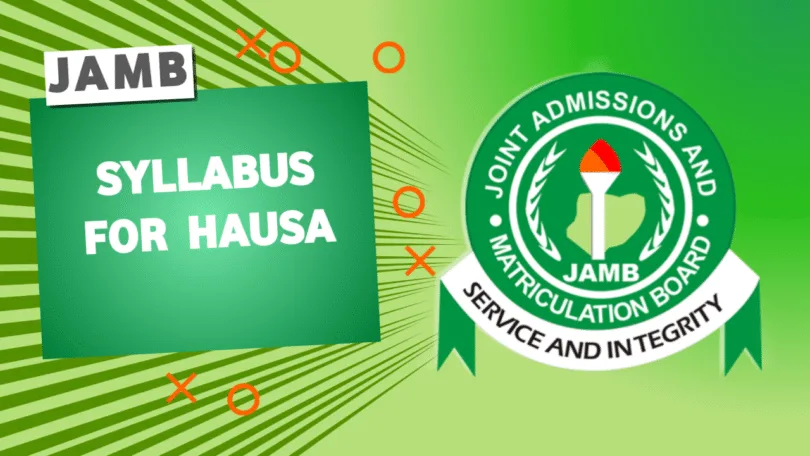The JAMB Syllabus for Hausa serves as an essential guide for candidates preparing for the Unified Tertiary Matriculation Examination (UTME) in the 2026/2027 academic session. This document outlines the key topics, objectives, and recommended study materials to help students master the Hausa language and its cultural elements.
By focusing on the JAMB Syllabus for Hausa, candidates can align their preparation with the examination’s requirements, ensuring a structured approach to learning. The syllabus emphasizes practical skills in reading, writing, and comprehension, alongside an appreciation of Hausa literature and traditions.
It is designed to foster linguistic proficiency and cultural awareness, making it a cornerstone for students pursuing studies in languages, education, or related fields. With the JAMB Syllabus for Hausa in hand, aspirants can build confidence and improve their performance in the computer-based test format.
| Title | Detail |
|---|---|
| Exam Type | UTME / Direct Entry |
| Exam Session | 2026/2027 |
| Syllabus Subject | Hausa |
| File Format | |
| File Size | 160KB |
The Joint Admissions and Matriculation Board (JAMB) updates its syllabi periodically to reflect current educational standards, but the core structure for Hausa remains consistent, focusing on foundational and advanced aspects of the language.
Candidates are encouraged to use this syllabus as a roadmap, dedicating time to each section to achieve a balanced understanding. Whether you are a native speaker refining your skills or a learner building from basics, the JAMB Syllabus for Hausa equips you with the tools for success. In the following sections, we delve into the specific topics, present them in an organized table for easy reference, and conclude with frequently asked questions to address common concerns.
Overview of the JAMB Syllabus for Hausa
The JAMB Syllabus for Hausa is divided into several key areas that cover the essentials of the language. It aims to develop candidates’ ability to communicate effectively in Hausa while appreciating its literary and cultural heritage.
The syllabus includes approximately 16 main topics, spanning grammar, vocabulary, comprehension, literature, and cultural studies. Each topic comes with clear objectives, such as explaining concepts or applying them in context, and notes on recommended textbooks for deeper study.
For the 2026/2027 session, the syllabus maintains its focus on practical application, encouraging candidates to engage with authentic Hausa texts and oral traditions. This approach not only prepares students for the exam but also enhances their overall linguistic competence.
Below is a detailed table summarizing the topics and their objectives, providing a quick reference for your study plan.
| Topic Number | Topic Title | Key Objectives |
|---|---|---|
| 1 | Sound System and Orthography | Identify and correctly use Hausa sounds, tones, and the official orthography; explain vowel harmony and consonant clusters. |
| 2 | Greetings and Introductions | Demonstrate appropriate use of formal and informal greetings; introduce oneself and others in various social contexts. |
| 3 | Nouns and Noun Phrases | Classify nouns by gender and number; form and use noun phrases including possessives and qualifiers. |
| 4 | Pronouns | Distinguish between personal, possessive, demonstrative, and interrogative pronouns; apply them in sentences. |
| 5 | Verbs and Verb Phrases | Conjugate verbs in present, past, and future tenses; form verb phrases with auxiliaries and negatives. |
| 6 | Adjectives and Adverbs | Describe qualities using adjectives; modify actions with adverbs of manner, time, and place. |
| 7 | Prepositions and Conjunctions | Use prepositions to indicate location and time; connect ideas with coordinating and subordinating conjunctions. |
| 8 | Sentence Structure | Construct simple, compound, and complex sentences; identify subject-verb agreement rules. |
| 9 | Questions and Negations | Form yes/no and wh-questions; negate statements using appropriate particles. |
| 10 | Comprehension Passages | Read and interpret prose and poetry excerpts; answer questions on main ideas, inferences, and vocabulary in context. |
| 11 | Composition Writing | Write coherent paragraphs on familiar topics; use correct grammar and varied sentence structures. |
| 12 | Oral Hausa | Pronounce words accurately; engage in simple dialogues on daily life themes. |
| 13 | Hausa Literature: Prose | Summarize key themes in selected Hausa novels and short stories; analyze characters and plot. |
| 14 | Hausa Literature: Poetry | Identify poetic devices in traditional and modern Hausa poems; discuss moral and social messages. |
| 15 | Hausa Culture and Customs | Describe major festivals, marriage rites, and social institutions; explain their significance in Hausa society. |
| 16 | Translation and Idioms | Translate simple sentences between Hausa and English; interpret common proverbs and idiomatic expressions. |
Preparation Tips for the 2026/2027 UTME
To make the most of the JAMB Syllabus for Hausa, create a study timetable covering all topics over 3-6 months. Begin with grammar fundamentals, then move to literature. Use past questions to simulate exam conditions, timing yourself for 40 questions in 30 minutes. Group study sessions can aid oral practice, while self-assessment tracks progress. Maintain consistency, revising weekly to retain information. Health matters too: balance study with rest to avoid burnout. By adhering to the JAMB Syllabus for Hausa, candidates position themselves for scores above the benchmark, opening doors to tertiary institutions.
READ ALSO: JAMB UTME Recommended Textbooks for All Subjects 2026
Recommended textbooks include “Sabon Yaki” by M. Ahmad and “Harshe Cif” by A. Yusuf, which align with syllabus objectives. Supplement with notebooks for summaries and flashcards for idioms.
READ ALSO: JAMB Syllabus for Economics 2026/2027 | Download PDF
How To Download JAMB 2026 Syllabus for Hausa PDF
Downloading the JAMB Syllabus for Hausa for 2026 UTME is a simple task to do if you are serious about it, below is how you cam actually get your copy as easy as possible :
- Visit the JAMB Syllabus website at (https://www.ibass.jamb.gov.ng)
- Check for the “Syllabus” section and click on it
- Choose “Hausa” as your subject
- Then locate the “Download” button beside it and click on it
- It will be saved to your phone automatically and you can access it offline anytime, any day.
- Alternatively, you can proceed to download the JAMB Hausa Syllabus below
JAMB Syllabus for Hausa 2026/2027 PDF Download
The JAMB Hausa syllabus PDF is available here. You just have to click on the “Download” button below to get it saved I to your smartphone without any delay. Get yours now!
DOWNLOAD
How to Use the JAMB Syllabus for Hausa Effectively
There are many ways of using the JAMB Syllabus for Hausa to study in preparation for the UTME, but some of these ways are more effective than the other.
Below are the most effective ways you should abide while using the JAMB Hausa syllabus for studies in preparation for the exam:
- Create a good timetable: Create a well structured reading timetable for your studies as it is more effective when you’re guided by time while studying than just to take a book to read at anytime
- Get JAMB Hausa Past Questions: Having past questions from 2000 to 2025 is recommended, you should always solve them after the time to read chemistry expires, that’s how you can tackle JAMB questions without fear
- Join Group Reading: Some people don’t like reading in a group which is fine, check yourself and see, if you’re someone that can cope reading with friends and gaining much, then find like-minded students and read with them to understand hausa better
- Make use of the recommended textbooks: JAMB also recommends some textbooks for Hausa you should make use of while studying. Try and get at least one to study along using the JAMB Hausa syllabus.
- Revise Regularly: Regular revision of what you’ve read makes them stick to your brain and that’s what will make you have full confidence in the examination hall.
JAMB Syllabus for Other Subjects
If you wish to check the or see the syllabus for any other subjects, the table below contains them and their syllabus respectively, just select the one you wish to see and click on it.
| Subject | Syllabus Link 🔗 |
|---|---|
| Arabic | See Syllabus Here |
| Use of English | See Syllabus Here |
| Mathematics | See Syllabus Here |
| Physics | See Syllabus Here |
| Biology | See Syllabus Here |
| Agricultural Science | See Syllabus Here |
| Economics | See Syllabus Here |
| Geography | See Syllabus Here |
| Government | See Syllabus Here |
| History | See Syllabus Here |
| Literature-in-English | See Syllabus Here |
| French | See Syllabus Here |
| Fine Art | See Syllabus Here |
| Music | See Syllabus Here |
| Animal Husbandry | See Syllabus Here |
| Igbo | See Syllabus Here |
| Chemistry | See Syllabus Here |
| Yoruba | See Syllabus Here |
| Islamic Religious Studies (IRS) | See Syllabus Here |
| Christian Religious Studies (CRS) | See Syllabus Here |
| Commerce | See Syllabus Here |
| Computer Studies | See Syllabus Here |
| Home Economics | See Syllabus Here |
| Principle of Account | See Syllabus Here |
FAQs
What is the main purpose of the JAMB Syllabus for Hausa?
The JAMB Syllabus for Hausa outlines topics and objectives to guide preparation, ensuring candidates cover essential language skills and cultural knowledge for the UTME.
How many topics are in the JAMB Syllabus for Hausa for 2026/2027?
There are 16 core topics, ranging from phonetics to literature and culture.
Are there changes in the JAMB Syllabus for Hausa this year?
The 2026/2027 syllabus retains the standard structure, with minor updates to reflect contemporary usage, but no major overhauls.
What textbooks should I use for the JAMB Syllabus for Hausa?
Key recommendations include “Gwaiba” for literature and “Fita Mahaifta” for grammar; consult the official list for full details.
How can I practice oral Hausa from the syllabus?
Engage in conversations, record yourself reading passages, or join language clubs to build fluency as per Topic 12.
Is translation a big part of the exam based on the JAMB Syllabus for Hausa?
Yes, Topic 16 covers basic Hausa-English translation, often appearing in 10-15% of questions.
How do I download the official JAMB Syllabus for Hausa?
Visit the JAMB portal or authorized educational sites for the PDF version, available free for the 2026/2027 session.





